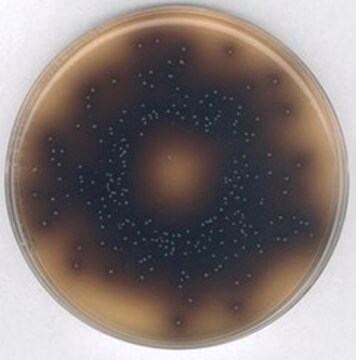80507
Bile esculin disks
suitable for microbiology
Synonym(s):
Esculin Bile Disks
About This Item
Recommended Products
product line
BioChemika
Quality Level
form
disc
shelf life
limited shelf life, expiry date on the label
technique(s)
microbe id | specific enzyme detection: suitable
application(s)
clinical testing
food and beverages
microbiology
storage temp.
2-8°C
suitability
Streptococcus spp.
General description
Components
Not finding the right product?
Try our Product Selector Tool.
Storage Class Code
11 - Combustible Solids
WGK
WGK 3
Flash Point(F)
Not applicable
Flash Point(C)
Not applicable
Personal Protective Equipment
Choose from one of the most recent versions:
Already Own This Product?
Find documentation for the products that you have recently purchased in the Document Library.
Articles
For microbiologists the most fundamental stain was developed in 1884 by the Danish bacteriologist Hans Christian Gram.
For microbiologists the most fundamental stain was developed in 1884 by the Danish bacteriologist Hans Christian Gram.
For microbiologists the most fundamental stain was developed in 1884 by the Danish bacteriologist Hans Christian Gram.
For microbiologists the most fundamental stain was developed in 1884 by the Danish bacteriologist Hans Christian Gram.
Our team of scientists has experience in all areas of research including Life Science, Material Science, Chemical Synthesis, Chromatography, Analytical and many others.
Contact Technical Service



